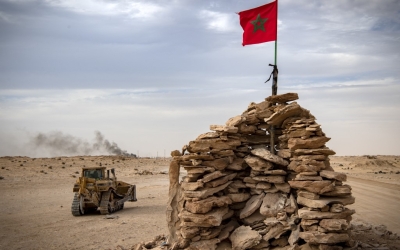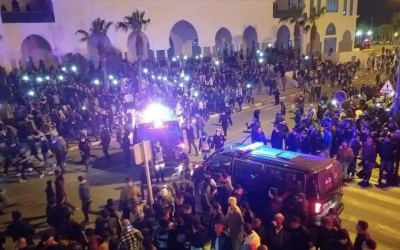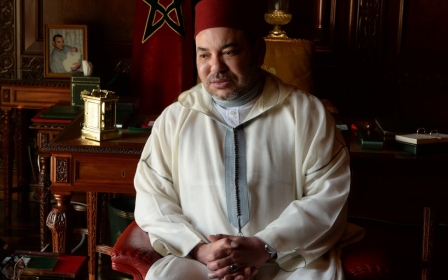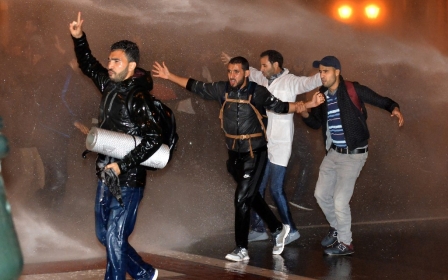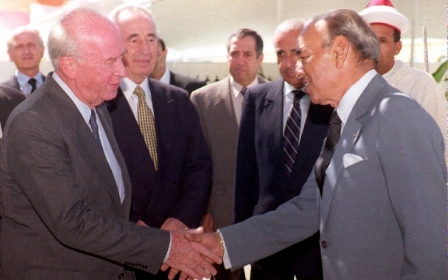Morocco's 'new development model' offers a lifeline to the monarchy
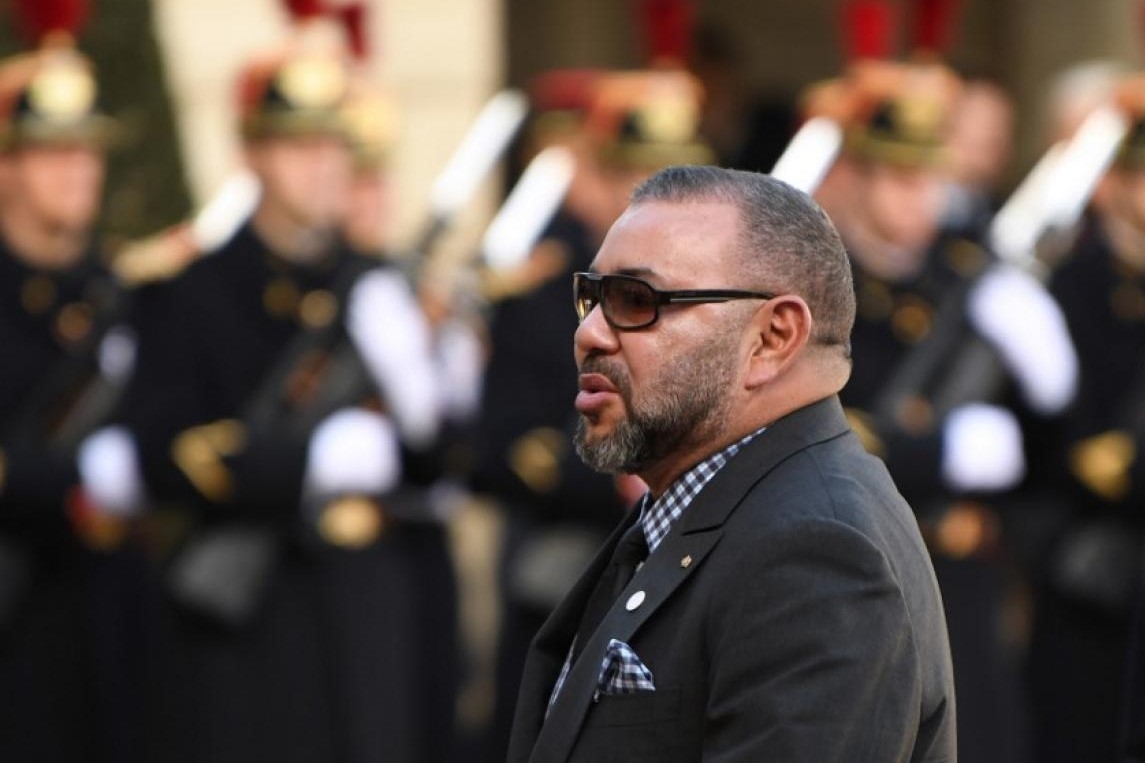
Late last month, as the chairman of Morocco’s Special Commission for the Development Model (CSMD), Chakib Benmoussa, a close ally of the royal palace, presented its report to the king, just as authorities were brutally dispersing demonstrators calling for the release of hunger-striking journalists Souleiman Raissouni and Omar Radi.
Rather than acknowledging the human rights crisis, the CSMD chairman delivered a surreal sermon emphasising “the role of the 2011 Constitution in reaffirming the role of the state in terms of fundamental freedoms ... based on the principle of a relationship of trust between public authorities and Moroccan society”.
This shoddy performance reflected the Moroccan government's lack of credibility, and the ruling elites' complicity in legitimising the country's authoritarian tendencies
This shoddy performance reflected the Moroccan government’s lack of credibility, and the ruling elites’ complicity in legitimising the country’s authoritarian tendencies. Apart from its content, little more than a rehash of earlier expert reports - the doomed “Fiftieth Anniversary Report” (2005) comes to mind - the document is overtly pro-regime.
One may well wonder whether it’s not just another governmental manoeuvre to continue clamping down on the fundamental rights and freedoms of Moroccan citizens while appropriating the nation’s wealth, starting with the precious metals and minerals extracted by the royal holding company, Managem Group.
Faced with an enduring socioeconomic crisis and an upsurge of protests around the country, King Mohammed VI has been hard at work trying to ease social unrest and to maintain his grip on the country’s political elites, regardless of Morocco’s representative institutions.
New MEE newsletter: Jerusalem Dispatch
Sign up to get the latest insights and analysis on Israel-Palestine, alongside Turkey Unpacked and other MEE newsletters
Since his accession to the throne in 1999, Mohammed VI has repeatedly made use of extra-governmental commissions to resolve societal issues. This time around, the regime needed to circumvent the very real risks of societal collapse by serving up a so-called “development alternative”.
King not held accountable
Vested with virtually unlimited powers, the Moroccan monarch is not held politically accountable, or even legally responsible, for his actions. It was therefore highly unlikely that the CSMD, most of whose members are close to the royal family, would even think of questioning the supremacy of the monarchy.
On the contrary, the authors of the report seem to have provided the embattled regime with what could be a vital lifeline, given the economic and health crises shaking the kingdom.
Better yet, the members of the commission, some of whom are self-proclaimed “intellectuals committed to democratic rule” and others “disinterested scientific minds”, openly praised the sovereign, whose name is mentioned 11 times in the report in reference to earlier royal speeches.
In nothing short of a tried-and-true exercise in the legitimisation of authoritarian power, the CSMD, to judge by the following excerpt, spared no pains: “The institution of the monarchy, symbol of historic continuity and stability, is the cornerstone upon which this vigorous construction is built, providing the nation with the strength and the audacity it requires to grow.
"The sovereign, the representative of this acknowledged singularity, the guarantor of the balance between a strong and fair state and a strong and dynamic society, is the embodiment of the leadership that the pursuit, achievement, and survival of great historical ambitions requires.”
In their attempts to save face, the authors of the report displayed considerable skill in the art of obfuscation, calling for “clarification” on the ambivalent relationship between the monarchy and other branches of government, while maintaining that the relations in question were explicitly defined under the 2011 Constitution.
The CSMD also failed to address the authoritarian excesses of Morocco’s intelligence apparatus, whose efforts to curtail civil liberties have undermined the relationship of trust between the government and the people. The report, for example, makes no mention of the interior ministry’s interference in political, economic and social matters.
Lack of intellectual integrity
According to the report, “the men and women of Morocco are committed to ensuring their nation’s commitment to peace and prosperity” - words strangely reminiscent of former US President Donald Trump’s “deal of the century”, also known as the “peace to prosperity” plan, to which Morocco adhered before deciding to normalise relations with Israel.
In vague and terribly specious terms, the authors of the report attempt to put forward the idea of “the Moroccan people’s patriotism and attachment to their country”, feigning to ignore the distress of the thousands of people fleeing Morocco for the bordering Spanish enclave of Ceuta, with the regime’s covert encouragement.
Tossing best democratic practices to the wind, the palace's horde of 'royal legitimists' outdid themselves this time
Disregarding the plight of the populations fleeing the kingdom (Morocco ranked 121st out of 189 countries in 2020, according to the UNDP Human Development Index), the CSMD report concludes that “economic empowerment is the condition for social inclusion and dignity”, referring to a proposal put forward by a resident of Jerada to build a battery manufacturing plant using lead extracted locally by Managem.
The committee members fail to mention, with an utter lack of intellectual integrity, the isolated status of the region. In 2016, the outbreak of the Jerada Hirak protest movement led to a brutal crackdown and heavy prison sentences.
On a different note, the report’s authors rightly call for “combatting collusion and conflicts of interest, emerging from the absence of clear boundaries between business and political circles and thereby eroding the people’s trust in public institutions and political stakeholders”.
Yet, the CSMD was not so bold as to recommend that these measures apply to the hegemony of the sovereign and his business cronies, nor to those people close to the palace involved in such questionable affairs as the Panama Papers scandal.
Charting a political course
The release of the report could be a political godsend for the monarchy, which is hoping to polish its tarnished image as an authoritarian regime riddled by crisis. Ten years on, the constitutional reforms announced with such pomp and circumstance in the aftermath of the 2011 Arab Spring are as elusive as ever.
But no worries. The regime of Mohamed VI has decided to call in its cavalry of princely advisers.
Tossing best democratic practices to the wind, the palace’s horde of “royal legitimists” outdid themselves this time, with their “national pact for development guaranteeing the strong moral and political commitment of all actors concerned before His Majesty the King and the entire nation”. There’s no time like the present for a “new” allegiance.
On the eve of this year’s legislative elections, the CSMD report will secure the king’s hegemonic hold on issues of development and growth, so that he can set the nation’s political course for at least the next decade.
As for the destitute masses, they will just have to make do with pipe dreams and political promises of a better Morocco by the year 2035. And if any of those have-nots happen to complain that the well has run dry, well then, “they can drink the sea water”, as the old Moroccan proverb goes.
The views expressed in this article belong to the author and do not necessarily reflect the editorial policy of Middle East Eye.
This article has been translated and condensed from the MEE French edition.
Middle East Eye delivers independent and unrivalled coverage and analysis of the Middle East, North Africa and beyond. To learn more about republishing this content and the associated fees, please fill out this form. More about MEE can be found here.



